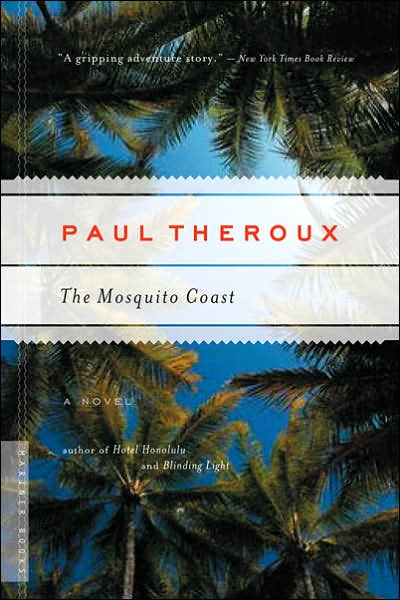Upon deciding to spend a year in Honduras, I thought it wise
to read up on the place. This has mainly involved reading Honduran related
news, but has also included a helpful dose of historical scholarship on my host
nation. Most of my reading, from both the journalists and academics, has been
highly pessimistic. Honduras, despite its sunny weather, has an unfortunate
history that has left a legacy of crime that dominates the headlines today.
Satisfied with my new knowledge of Honduras if unexcited
about its bleak content, I turned to reading a novel set in Honduras. Now I was not sure that this would exist, but
one noteworthy piece of fiction stood out from the pack. The Mosquito Coast, by Paul Theroux, fulfilled my minimalist
requirements of being an English-language novel set in Honduras, but also stood
out for a couple of reasons. First, Theroux is a fairly acclaimed writer who
has written a number of best-selling travel memoirs. Second, he comes from a
family of writers, and is the uncle to Justin Theroux, who starred in
Mulholland Drive and wrote Tropical Thunder and Iron Man 2. The younger Theroux
is also dating Jennifer Anniston. I obviously deduced from this that anyone
cool enough to have a nephew who picked up Brad Pitt’s sloppy seconds must be a
good novelist. But then I, um, read the book.
The Mosquito Coast,
to my initial concern, began in Massachusetts, before transitioning to
Baltimore, a cargo ship, and finally Honduras. The novel, despite Theroux’s
background as a travel writer is not about any one of these places. There are
plenty of details about Honduras which immediately stuck out to me though; the
terrible condition of the dogs in the country, the ubiquity of bananas and
other cheap fruit, and of course the ever-present and always thirsty mosquitos
scavenging for their next meal.
The focus of the book is the father-son relationship at its
corps. Charlie, our narrator, is a perceptive 13 -year old boy. Like most kids
his age, he is embarrassed and proud of his father. In comparison to other
American teenagers, Charlie probably has more reason to feel this way.
Charlie’s father is a genius inventor who knows everything. He can quickly
rebut an agriculturalist on growing crops, or even challenge a preacher on
scripture. When it comes to quirky inventions, no one top Charlie’s pa, called
by his wife, Ally. But the man is also an eccentric, often rambling about
politics or the end of America to innocuous observers.
The book is about Ally’s descent into madness. Or was he
always crazy? He moves the family from its home in the United States to
Honduras, where he brilliantly begins his own jungle civilization. But things
go awry, and it seems that Ally’s mind follows.
The Mosquito Coast is
entertaining, but it falls far short of reaching the great novel plateau. The
book’s largest problem stems from its central conflict: Ally’s fall from the
reader’s grace. This could have been accomplished tragically (by emphasizing
the impact it has on the family), hilariously (what’s funnier than insanity),
or been suspenseful (will he get the family killed?). Theroux attempts all of
these elements, but ultimately comes up short on all counts. The result is a
readable novel, if not a particularly deep or funny one.

No comments:
Post a Comment